Flickr user raneko (who is no stranger to regular Cult readers) has just uploaded a bunch of fantastic photos of Apple mice through the ages.
Gallery: 25 Years Of Apple Mouse Evolution
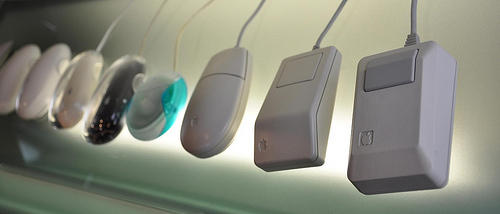

Flickr user raneko (who is no stranger to regular Cult readers) has just uploaded a bunch of fantastic photos of Apple mice through the ages.

Tis the holiday season and we want to give your iPhone a present. Star Walk, my childhood dream of an iPhone app, has given us 5 codes to give away to Cult of Mac Twitter followers.
Send us a tweet on Twitter with your favorite night sky memory by December 23rd at 2 p.m. PST and we’ll pick a winner at random. You must include @cultofmac in your tweet to be counted in the contest.
Here’s an example: “I remember driving through West Texas at night and softly weeping at the vastness of space @cultofmac”
Get creative even though we’re selecting at random. You can pick up Star Walk, the iPhone astronomy app, from iTunes for $2.99.

One of the features I loved from the first moment I saw it in Windows 7 was Snap, the one that lets you instantly resize any document window by dragging it to one side of your screen.
Irradiated Software makes a Mac utility that does a similar job. It’s called Sizeup, and I find it pretty useful. But it’s keyboard-controlled, not mouse-controlled, and you have to remember some new shortcuts to get the most from it. How about a mouse-controlled alternative?
Enter Cinch, a new app from the Sizeup developers.

A word to drivers down under: make sure your license and registration are up to date.
Police in Tasmania are using iPhones to snap plates, relay the pics to a database of unregistered vehicles and unlicensed and disqualified drivers via an app developed for the department.
In just 10 days of operation, the app has outed 167 unregistered vehicles and caught 107 disqualified or unregistered drivers, the Mercury reports. Formerly, officers had to radio in the information and wait for a co-worker to check.
Within the first 10 minutes of trying it out, police pulled up alongside a car at a traffic light ran the app and found the car was unregistered. They pulled over the car, found the driver was also without a license and drugs in the car, too.
The app, designed by the Tasmania police department, is also used by motorcycle cops.
Via Mac Daily News
A federal judge Tuesday dismissed a liability lawsuit against Apple, just hours after the Cupertino, Calif. company released a firmware update claiming to cure complaints about the iMacs screen. The lawsuit, which potentially could have become a class action, claimed Apple knowingly sold the allegedly defective computers.
While the lawsuit was dismissed as being too broad, Judge Jeremy Fogel of the U.S. District Court for the Northern District of California ruled the claim could be resubmitted to add more detail, thus reducing the suit’s scope, reports said. Apple “internally recognizes and concedes” the defect without alerting consumers, the lawsuit alleged.
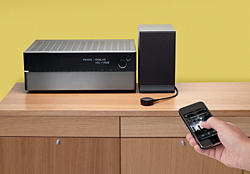
Belkin’s latest dongle — the tiny little Bluetooth Music Receiver — is a cute little gadget: it streams music from your iPhone or iPod Touch to any stereo thanks to the magic of A2DP.
It’s simplicity itself. All you do is plug the glowing, cycloptic dongle into your stereo, either through the 3.5mm headphone jack or using your stereo’s RCA cables. Once that’s done, you pair it with your iPhone, iPod Touch, or other A2DP-compatible PMP, and you’re good to stream music to your stereo from up to 33 feet away whenever you want. It’ll even remember six different devices.
For $50, it’s not a bad buy, although I can’t imagine I’ll take the plunge: 33 feet isn’t very far, and I figure Apple has got to get around to letting me stream my iPhone’s music to my Airport Express network through WiFi one of these days.
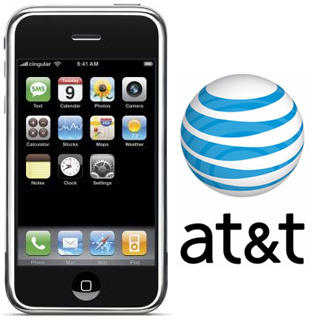
“Methinks AT&T doth protest too much,” might have been Hamlet’s response to the carrier again denying it will institute data tiers for iPhone users. Attempting to avoid a storm of protests over earlier comments, AT&T Mobility President Ralph de la Vega now tells BusinessWeek: “I guess I should have been more clear.”
The comment was the second in one week by de la Vega concerning a Dec. 9 AP report quoting the AT&T exec mentioning incentives for iPhone owners to “reduce or modify their usage.” AT&T has said iPhone owners use 40 percent of the carrier’s network capacity despite their being just three percent of smartphone users.

The iPod is always a tricky thing to manipulate in this chapping, frostbiting weather. In the December wind, the hand freezes quickly in a contorted, blue-skinned claw around the iPod Classic; fingers pressed against the iPhone’s frigid touchscreen tend to break off like icicles at the tips.
For iPod manipulation in these hypothermic months, then, a solution, courtesy of alpine gear makers, The North Face. They’ve just introduced two new jackets — the Hustle Audio Jacket for guys, the Femphonic Audio Jacket for women — which builds an iPod remote right into the sleeves. You can change tracks, play, pause and wiggle the volume around without once exposing your fingers to the ice-fanged bite of the season.
North Face jackets tend to be expensive, so you can expect to pay $350 for both the Hustle and Femphonic audio jackets, but while that’s a couple hundred dollars more than what you can theoretically buy an off-brand winter coat for, it’s only a $50 premium over North Face’s usual coat prices.
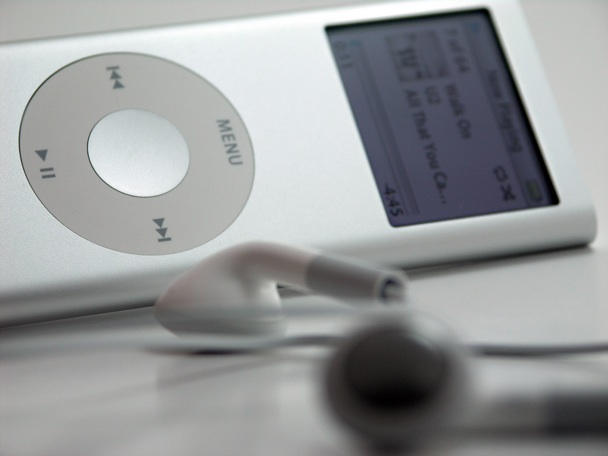
Canadian researchers have developed an add-on that makes iPods easy to use for people with disabilities.
Called the CanPlay podWiz, it lets users control off-the-shelf Apple iPod Nanos by using knuckles, jaw muscles and voice prompts. It’s a black box with a microcomputer that acts as a switcher for external commands that are delivered through a range of means and can be wheelchair mounted. (Unfortunately, there don’t seem to be any pics available).
It’s the brainchild of CanAssist, a research lab at the University of Victoria, which has also developed a host of cool ideas from the Polecam Power Chair and to a launcher that wheelchair users can throw balls to their dogs with.
125 CanPlay podWizzes will be given to young Canadians this Christmas, but director Neil Livingston says he’s in touch with Apple to make the product commercially available through its distribution network. No word on how much it might cost.
Via Globe and Mail
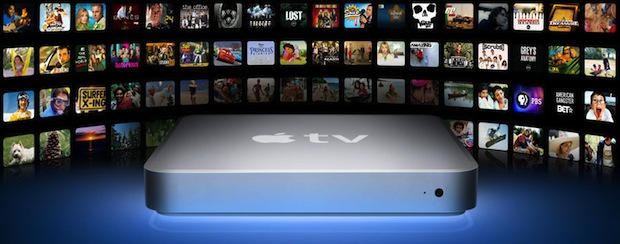
CBS and Disney – two television networks with strong ties to Apple – are considering a plan by the Cupertino, Calif. company to revamp how Americans receive TV programming, according to one report. Apple would like to expand its iTunes service to offer consumers major television content via the Internet.
The proposal would “offer access to some TV shows from a selection of major U.S. television networks for a monthly fee,” the Wall Street Journal reports.
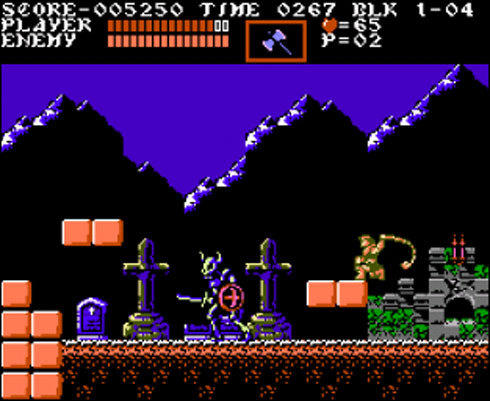
Emulators themselves are on fairly well-established legal ground, but the ROM files required to play all of your favorite classic video games are far sketchier. Technically, if you rip a copy of a game yourself as a backup, you’re in the clear… but since few have the technical acumen or equipment to do so, they usually resort to downloading the ROMs from warez sites.
That’s primarily the reason why Apple has traditionally kept its App Store so closed off to emulators. So expect Nescaline, an NES emulator for the iPhone and iPod Touch, to be pulled as soon as Apple gets wind of it.
On sale for $6.99, Nescaline has a full feature list, including multitouch, light gun and save state support. It ships with five homebrew NES games, which is certainly legal. Unfortunately, its cardinal sin — at least in the eyes of Apple — is allowing users to input a URL where they can download additional ROMs. That means it’s as easy to put a warezed copy of Castlevania III on your iPhone as it is to cut-and-paste a Google search.
Expect Nescaline to be pulled quick, and if it comes back to the App Store at all, for the download feature to be neutered. Unfortunately, for right now, if you want to play emulators on your iPhone, legally owned games or not, jailbreaking is still your best bet.
Update: That didn’t take long. It’s been removed from the App Store.
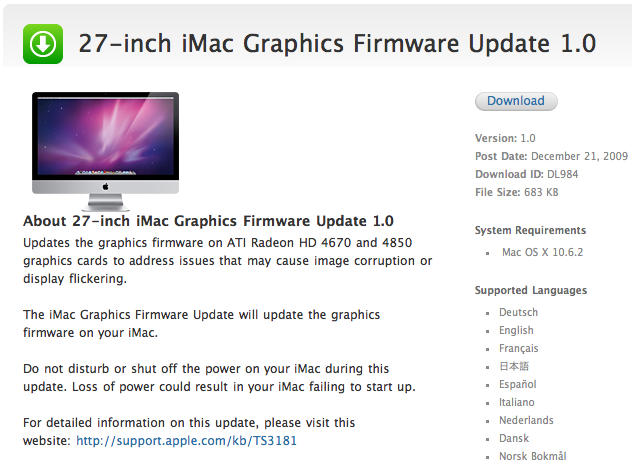
Apple’s 27 inch iMac is the sexiest machines in Apple’s already sexed-out line of computers, but it’s been worth waiting to buy one: the first batch had numerous problems, including cracked screens, flickering displays and a yellow, nicotine-like graphical patina.
Rumor had it that Apple was scrambling to replace faulty ATI Radeon HD 4670 and 4850 GPUs on their iMacs, which strongly implied the problem was hardware, not software. Nevertheless, Software Update has just pumped out a Graphics Firmware Update for the 27-inch iMac that “address[es] issues that may cause image corruption or display flickering.”
Jury’s still out on whether or not this solves the widescale problems people are having with their iMacs. Any cultists out there with a 27-incher who can tell us how their baby is handling its new medicine?

If you’re looking for that last minute gift, an Apple Store is a fine destination. But if, like my hirsute Uncle Bob, your wrapping skills max out at wadding a clump of disintegrating newspaper around your gift and entombing it in an impenetrable, inch-thick layer of duct tape upon which you’ve written your season’s greeting in bold, permanent marker, the Apple Store might also have you covered: select Apple Stores are now offering free wrapping.
The way Apple is handling wrapping is smart. Instead of buying your iPod or MacBook Pro and then thrusting it at some beleaguered wrapper temp, already light-headed from papercut induced blood loss, Apple has set up an express line which sells exclusively pre-wrapped gifts.


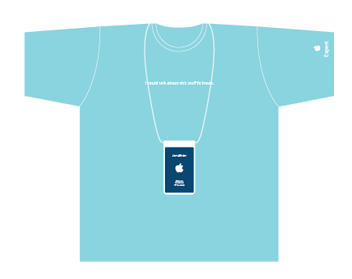
If you know your way around Macs, can untangle the gnarliest iPod problems and love sales, Apple wants you for its retail stores.
To handle the general surge in customers — Apple’s 5th Avenue store is outperforming Tiffany’s, to name just one — the stores are adding a new role called “Expert.”
Previously these were internal promotions, so it sounds like you’d have to be a cut above the average “Genius” with an interest in sales and management.
Apple’s ideal Expert from the job description:
• (Seeks) A career in sales where you can share your passion for Apple in a fast-paced and dynamic team environment.
• You love working with people — it energizes you.
• You embrace Apple’s standards of customer service and live them every day.
• You like being the first person on the block to touch new technology. And you like to share that knowledge.
• You love learning. And you’ll learn from people every day.
If you think you can cut it, it looks like every Apple retail store is on the lookout for in-house Experts to don the new sky-blue T-shirt.
Via Ifoapplestore
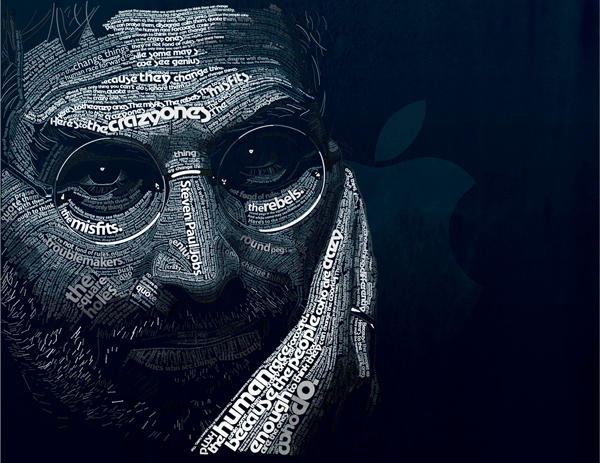
So what if Time magazine passed him over for person of the year: Steve Jobs beat out a couple thousand CEOs around the globe to be named the best-performing CEO by Harvard Business Review.
Researchers looked at what execs brought to the table and to shareholders from 1,999 publicly-held companies worldwide during the entire time of their tenure.
Though they admit “it may come as no shock that Steve Jobs of Apple tops the list,” it does seem a little surprising that Bill Gates is absent. No shocker: Gates is out of the running because the research only considered execs who took the helm from 1997 on.
Even without Microsoft, tech execs took the lion’s share of the top 10, including Yun Jong-Yong at Samsung Electronics (ranked 2), John T. Chambers, Cisco Systems (ranked 4), Jeff Bezos from Amazon (7), Margaret C. Whitman eBay (8) and Eric E. Schmidt Google (9).
So what put Jobs ahead of the pack?
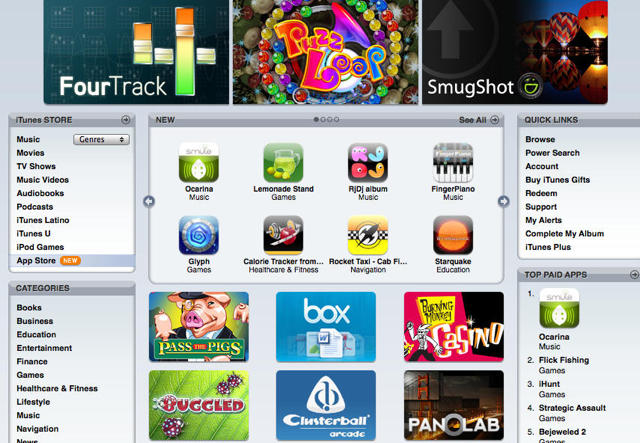
Apple seems to have been caught off-guard by the success of its App Store. Launched around one year ago, the online store for iPhone and iPod touch applications recently topped 2 billion downloads. Now an iPhone investor says Apple would have been satisfied with a fraction of the current demand.
“We had no idea there would be 2 billion downloads by October,” Matt Murphy, a partner with Kleiner Perkins Caufield & Byers, venture capitalists that helped fund the first iPhone developers, told the Financial Times.
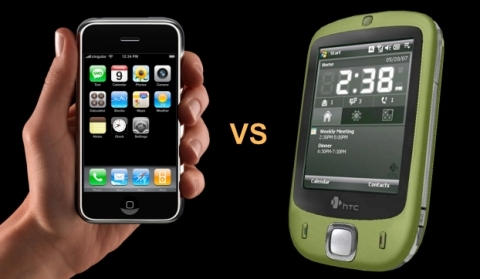
A widening gulf appears to be growing separating iPod touch and iPhone owners’ willingness to run the latest Apple operating system software. Only 55 percent of iPod touch users have upgraded to OS 3.0 or higher, in stark contrast to around 95 percent of iPhone owners, a survey indicates.
At the heart of the disparity appears Apple’s decision to charge iPod touch users for upgrading, while OS 3.x is free for iPhone owners. Also, many features in OS 3.0 and higher are targeted toward the iPhone, rather than the non-cellular iPod touch.
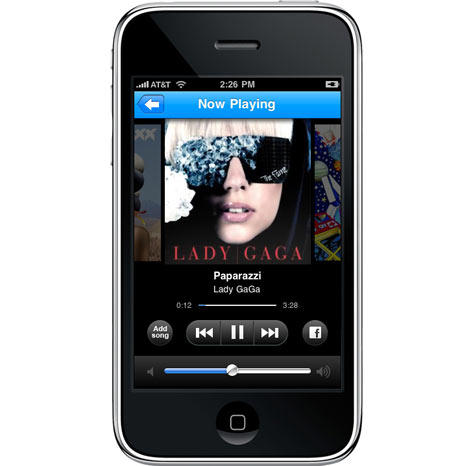
When Apple purchased streaming music service Lala a couple of weeks ago, the most plausible use for such an acquisition — the addition of streaming functionality to iTunes — promptly caused our butts to scuttle in anticipation of iTunes-in-the-cloud.
Still, the buy was problematic. Considering that it has been rumored that Apple was buying LaLa to kill it and that it was a purchase made just to thwart Google, some wondered if Apple, in a worst case scenario, intended to shutter the entire site, or in a slightly better case scenario, would simply shut Google out of LaLa… an action that would promptly kill Google’s Music Search, which is powered by LaLa.
Luckily, it looks like Apple has no plans to shut Google out of LaLa. “We have enjoyed a good relationship with Apple for many years, and that continues to be the case,” R.J. Pittman, Google director of product management, told BusinessWeek. “We are agreeing to continue to leave the service as it is.”
Even so, this has to be a lesson to Google: make sure you own the companies and tech that power your search methods. With Apple now in control of LaLa (and consequently, Google Music), Google can’t be resting easy.
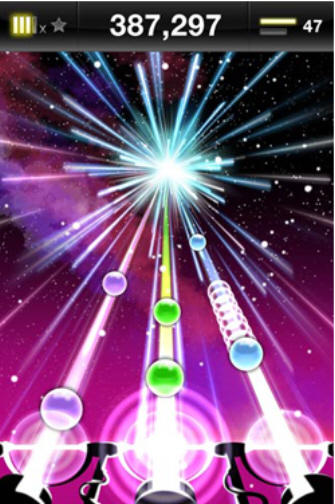
You can take your business school degree and cram it up your plush Christmas stocking: iPhone games developer Tapulous, best known for their rhythm game Tap Tap Revenge, are now bringing in $1 million a month in sales.
In the laughable understatement of the year, Tapulous says they are profitable. Tap Tap Revenge has been installed on over one-third of all iPhones and iPod Touches. CEO Bart Decrem says that he experiences his company to exponentially grow as the mobile app market gets broader. “It’s going to be big and all of a sudden people are going to say, ‘holy cow, where did those guys come from?'”he said.
That’s great for Tapulous and its small constabulary of employees — it couldn’t have happened to a nicer bunch of guys — but they are, of course, in the minority. I suspect Tapulous just has too much momentum to stop: they launched an iPhone game early inspired by a very popular and casual-friendly genre of music games like Rock Band and Guitar Hero, and they can ride that early success for awhile. Things are doubtlessly not so rosy for the developers trying to get their apps noticed in a sea of a hundred thousand now.
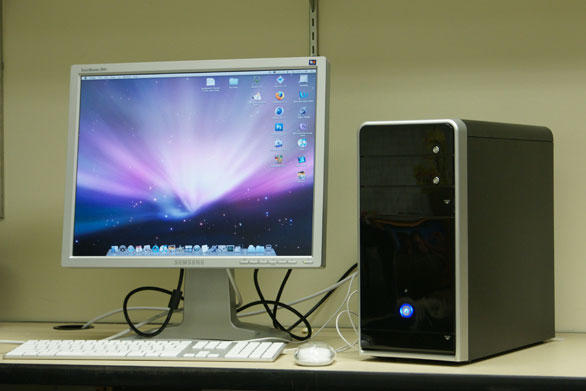
According to Judge WIlliam Alsup’s ruling against the notorious Mac clone makers, Psystar has until December 31st to comply with a permanent injunction against the company from selling computers that have been modified to run Apple’s OS X operating system. But will Psystar come back from the dead?
There’s conflicting reports coming out from both Apple and Psystar’s camps concerning the fate of the Florida computer retailer. Psystar attorner Eugene Action was recently quoted by the Dow Jones Newswire as saying that “[Psystar] will not be in business” and that the company would be “shutting down immediately” by laying off their eight employees.
That seems pretty clear cut, but now K.A.D. Camara, who also represented Psystar in their legal battle against Apple, is saying the opposite: “Regrettably, Mr. Action was misquoted in an early story that seems to have been picked up elsewhere,” he said. “Psystar does not intend to shut down permanently.”
It’s hard to imagine how the tiny little company, already $2.7MM in the hole after having to pay Apple damages, will manage to survive: they aren’t known for anything besides their Open Mac computers, and they only ever successfully sold a handful of them. My guess this is just a blanket denial to keep options open, and the reality is more likely that they will have to close. Sayonara, Psystar.
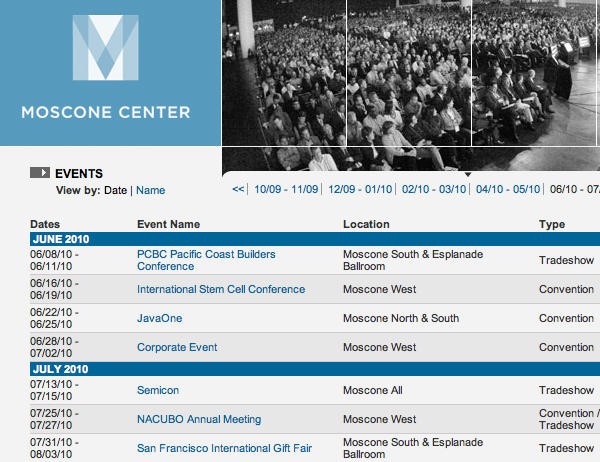
Mark your calendars. It looks like we have a date for next year’s World Wide Developer’s Conference.
Thanks to an update to the Moscone Center’s summer schedule, it now looks like this year’s WWDC will be held from Monday, June 28th, 2010 to Friday, July 2nd, 2010. There’s no official confirmation just yet, but the Moscone Center has blocked off those dates for a “Corporate Event.”
That can really only be one thing. It overlaps nicely with the third anniversary of the iPhone’s release… and, not so coincidentally, the presumed lapse of AT&T’s exclusivity deal. Even if Apple doesn’t reveal a new iPhone model at WWDC this year (and they will, if only to bump screen resolution to be competitive with the likes of HTC Droid and the Nexus One Android smartphones), I imagine we will all be happy to hear the announcement of new carrier choices. God knows we need the option.
[via Macrumors]

httpvhd://www.youtube.com/watch?v=NmgKDvWdi6o
Over the weekend, Seth Myers’ made a joke about the iPhone’s inability to actually place a call thanks to AT&T’s shoddy service during “Weekend Update” on Saturday Night Live. The joke was terrible, but as terrible as it was, the entire audience immediately burst into hysterical laughter: they all knew what he was talking about.
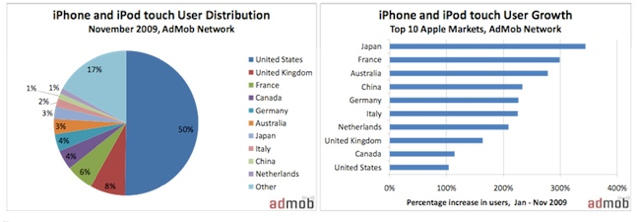
The image of Apple’s marketplace being only within the shores of the United States appears as valid as Microsoft’s claims about Vista. The United States was tenth in the countries experiencing the most growth in demand for Apple’s handset, a new survey found Friday. Instead, Japan, France and Australia are Apple’s top three markets for its iPhone and iPod touch.
The Mobile Metrics report from AdMob said sales to Japan in 2009 grew 350 percent, while France saw a 300 percent jump with Australia close behind. The U.S. and Canadian markets showed more than 100 percent growth this year. Although U.S. growth lagged far behind the leaders, 50 percent of all iPhone and iPod touch users make the U.S. home, according to AdMob.
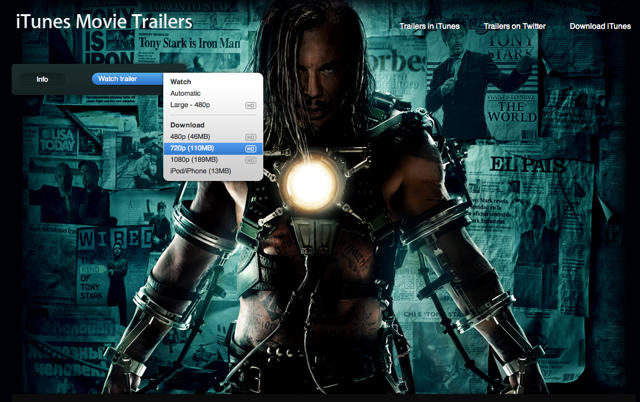
Fanboys we. Ever since Paramount released the first official Iron Man 2 trailer, we’ve been looking for a reason to post a link to it. After all, Robert Downey Jr’s sublime cockiness and his high regard for the fusion between technology and design is pansexual geek porn for all.
Still, the grim-knuckled assertion that Tony Stark uses a Mac seems like a tenuous reason at best to direct readers of an Apple blog to watch Scarlett Johannson sultrily pose in a leather cat suit, or a shirtless Mickey Rourke to flail a couple of electric whips about.
Luckily, though, Apple accompanies the roll-out of the new Iron Man 2 trailer with a refresh of the Apple trailers page design, which brings it more in line with the way the iTunes Store now displays information. It’s an incremental roll-out, and the only other trailer to get the treatment so far is Shrek Forever After… but I don’t think that’s any reason to link you to a fourth installment of sassy donkeys and fairy tale fart jokes.
Anyway, enjoy the trailer, comforted by the fact that you are edifying yourself in the constantly evolving world of Apple interface design. Then join me in the comments to talk about all the robot smashing going on: is it just me, or does this trailer just sort of run out of steam halfway through?